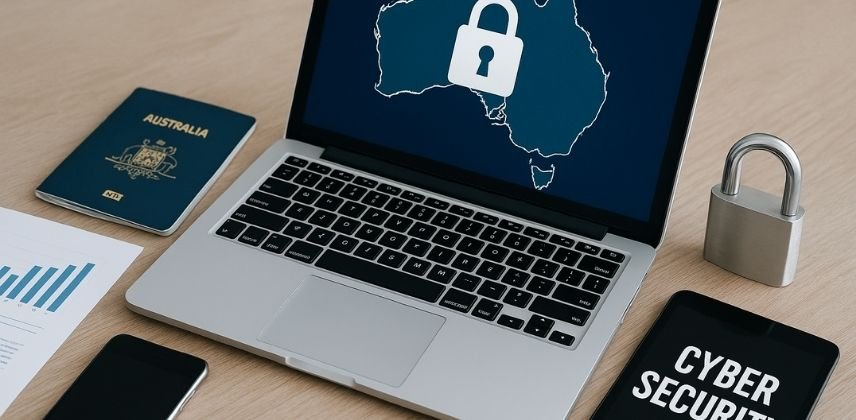Essential Cybersecurity Practices for Australian Small Businesses in 2025
Discover the must-have cybersecurity practices for Australian small businesses in 2025. Learn how to protect your data, prevent scams, secure devices, and stay ahead of cyber threats.

Cyberattacks targeting Australian small businesses have increased by over 42% in the last two years, with scams, phishing, data breaches, and ransomware becoming more advanced than ever. In 2025, cybercriminals are using AI-powered attacks, automated bots, and deepfake scams — making cybersecurity no longer optional, but essential.
Whether you run a plumbing company, an e-commerce store, a digital marketing agency, or a local café, protecting your data, finances, and customers should be your top priority.
This guide breaks down the must-have cybersecurity practices for Australian small and micro businesses in 2025.
1️⃣ Enable Multi-Factor Authentication (MFA) Everywhere
Passwords alone are no longer enough — attackers crack them in seconds using AI tools.
MFA adds a second step like:
- SMS code
- Email OTP
- Authenticator apps
- Physical security keys
Why it matters: Most cyberattacks in Australia start with stolen or weak passwords. MFA blocks 90% of unauthorised login attempts.
2️⃣ Use Strong, Unique Passwords + a Password Manager
In 2025, reused passwords are one of the biggest security risks.
Use a password manager like:
- 1Password
- LastPass
- Bitwarden
Tip: Never store passwords in Notes, WhatsApp, or Google Sheets.
3️⃣ Train Your Team to Identify Modern Scams (Very Important in Australia)
Australia is facing a huge rise in:
- Fake invoices
- Deepfake voice calls
- Business email compromise (BEC)
- Fake delivery scams
- Phishing emails mimicking ATO, Telstra, Australia Post
Simple employee training prevents 80% of attacks.
Teach staff to:
- Check the sender’s email
- Never click unknown links
- Confirm payments by phone
- Report suspicious messages immediately
4️⃣ Keep All Devices Updated (Phones, Laptops, POS Systems)
Cybercriminals exploit old software bugs. Always update:
- Windows & MacOS
- iOS & Android
- Chrome, Safari, Firefox
- WiFi routers
- POS & business tools
Turn on automatic updates to stay protected.
5️⃣ Use Australian-Compliant Antivirus & Endpoint Protection
Basic antivirus is not enough in 2025. Use business-grade protection that detects ransomware, spyware, and unauthorized access.
Recommended Tools:
- Trend Micro Australia
- Bitdefender GravityZone
- CrowdStrike Falcon
- Microsoft Defender for Business
6️⃣ Backup Your Data Daily — and Keep One Copy Offline
If you don’t have backups, you don’t have your business.
Use cloud + external backups:
- Google Drive
- OneDrive
- Dropbox Business
- Offline hard drive backup
7️⃣ Protect Your Website With Essential Security Tools
Australian small businesses often get hacked through their websites.
- Use SSL (HTTPS)
- Install firewall + bot protection
- Scan regularly for malware
- Limit admin access
- Use secure hosting
If you use WordPress:
- Install security plugins like Wordfence or Sucuri
- Update plugins weekly
- Replace outdated themes
8️⃣ Secure Your Business WiFi
Hackers can enter your network through weak WiFi.
- Change default router password
- Use WPA3 encryption
- Hide your SSID
- Create separate guest WiFi
- Limit access to admin systems
9️⃣ Review Your Cybersecurity Policy Every 6 Months
Your policy should include:
- Password rules
- Remote work security
- Device use policy
- Data handling rules
- Incident response plan
🔟 Consider Cyber Insurance
Cyber insurance helps with data breach recovery, legal support, customer notifications, loss of income, and ransomware incidents.
Final Thoughts
Cybersecurity in 2025 is no longer just for big companies. Small Australian businesses are now the primary targets because attackers know they have limited protection.
By implementing these essential practices — MFA, strong passwords, regular updates, secure backups, and team training — you’ll be protecting your business from 95% of modern cyber threats.
Stay smart. Stay protected. Stay one step ahead.
Share
What's Your Reaction?
 Like
0
Like
0
 Dislike
0
Dislike
0
 Love
0
Love
0
 Funny
0
Funny
0
 Angry
0
Angry
0
 Sad
0
Sad
0
 Wow
0
Wow
0















